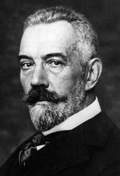Theobald von Bethmann-Hollweg descended from the family of Brandenburg landowners. Educated as lawyer in the universities of Strasbourg, Leipzig and Berlin, he received a job at state service in 1879. After the death of his father Bethmann-Hollweg inherited his seat in the local Landrat (1886-1896). In 1890 he briefly was a member of the German Reichstag from the Reich Party. In 1899, he was appointed the district president in Bromberg and later senior president of the Brandenburg province. In March 1905 Bethmann-Hollweg assumed the office of the Prussian minister for the interior. With the help of Bernhard von Bülow, on 24 Jun 1907 Bethmann-Hollweg assumed the post of state secretary for internal affairs and vice president of the Prussian ministry. After the resignation of Bülow, Emperor Wilhelm II appointed Bethmann-Hollweg as Reich Chancellor, foreign affairs minister and minister president of the Prussian government. Though his attempt to reform the Prussian election law and to extend the franchise failed in 1910, Bethmann-Hollweg succeeded in pushing through a liberal constitution for Alsace-Lorraine. Expecting no global consequences, the government of Bethmann-Hollweg encouraged Austro-Hungarian aggression in July 1914. For strategic reasons, Bethmann-Hollweg approved the invasion of German troops into the neutral Belgium. However, his skepticism towards the outcome of World War I for Germany put him on odds with the high military command. In early 1917 he reluctantly agreed to unrestricted submarine warfare, but in July 1917 Generals Hindenburg and Ludendorff insisted on his resignation. In 1919, the parliamentary committee for investigation of war crimes raised accusations of warmongering against Bethmann-Hollweg, but he denied the charges. Biography source: [2] |

